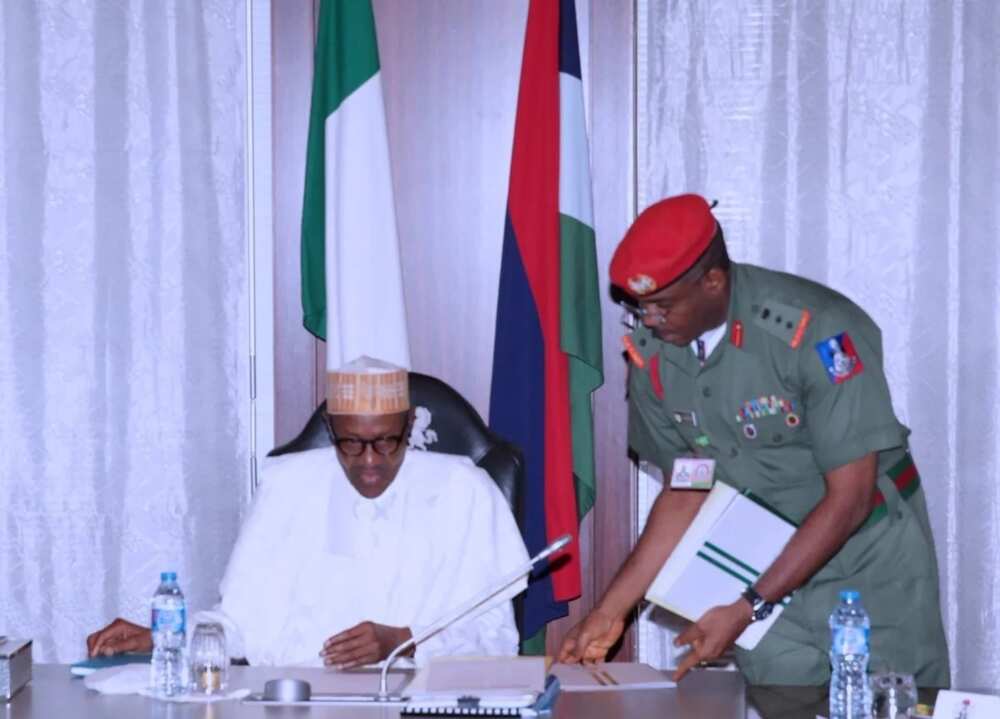We'll override President Buhari if he does not sign Peace Corps bill - National Assembly
- The controversy surrounding the Peace Corps bill is still on
- The National Assembly seems hell-bent on making sure the bill sees the light of the day
- Nigerian federal legislators say they are ready to override the president to ensure the bill sees the light of the day
The National Assembly, on Friday, February 16, said it would not hesitate to invoke the relevant session of the Nigerian 1999 constitution, and override the executive powers of President Muhammadu Buhari, if he does not eventually assent to the bill establishing Nigerian Peace Corps.
The Senate had passed the Peace Corps Bill on November 25, 2016, shortly after the House of Representatives passed same.
A conference committee of both chambers was also inaugurated on December 8, 2016, to harmonise the bill passed at different levels.

READ ALSO: Vacate Peace Corps office within 48 hours - House of Representatives tell police
The lower house therefore, laid and adopted its report on January 19, 2017, while the Senate adopted its report on July 25, 2017.
The clean copy of the bill marked 'Nigerian Peace Corps (Establishment) Bill 2017' was then transmitted to the presidency on December 27, 2017, by the Clerk to the National Assembly, Mr. Mohammed Ataba Sani-Omolori, after 3 months.
President Buhari has however kept mute on whether the bill would be assented to or not.
In a chat with a national newspaper this week, the spokesman for the House of Representatives, Honourable Abdulrazaq Namdas, said the members would wait patiently for President Muhammadu Buhari to write the National Assembly if he would not append his signature to the bill before deciding on the next step.
Namdas said the lawmakers were aware that the president was in the habit of giving reasons whenever he rejects a bill sent to him by the legislature.
“But if we wait up to a certain time and the usual excuses we expect of him does not come then the House may take a further action to override the president.
“If you remember just last week he returned three bills stating the reasons he refused to sign them into law,” Namdas said.
Speaking on behalf of the Senate, the chairman, Senate committee on media and public affairs, Senator Sabi Abdullahi, said the Senate will do what the constitution specifies in case Mr. President refuses to assent the Peace Corps Bill.
He said that the constitution of the Federal Republic of Nigeria provides for what should be done if a bill passed by the National Assembly, transmitted to the president for assent did not receive the assent of the president.
“For me personally I see it as a very good thing; it is not new to Nigeria but it is happening in many other countries so that was why in the first instance, the National Assembly supported it,” he said.
The Speaker of House of Representatives, Yakubu Dogara, had also vowed that the National Assembly would exercise its function as enshrined in the constitution, if Mr. President fails to sign the bill.
The Nigerian Peace Corps (Establishment) Bill 2017, when signed into law, would give legal backing to the existing Peace Corps of Nigeria under the leadership of Dr. Dickson Akoh.
The head of the Peace Corps, as captured in the bill, shall be referred to as National Commandant, to be appointed by the president upon recommendations of the supervising minister, for the period of 5 years which is renewable once.
The core mandates of the Corps is to develop, empower and provide gainful employment to the youths, in order to facilitate peace, volunteerism, community services, neighbourhood watch, nation-building and other related matters.
READ ALSO: Police, Peace Corps supporters clash in Abuja
Similarly, members of the Not Too Young To Run movement, recently urged President Buhari to assent to the age reduction bill which they are championing for young Nigerians to be qualified for political office.
They however advised members of the National Assembly to veto the president, should he delay or declines assent to the bill.
EXCLUSIVE: Be patient with President Buhari, Femi Adesina tells Nigerians on Legit.ng TV
Source: Legit.ng
